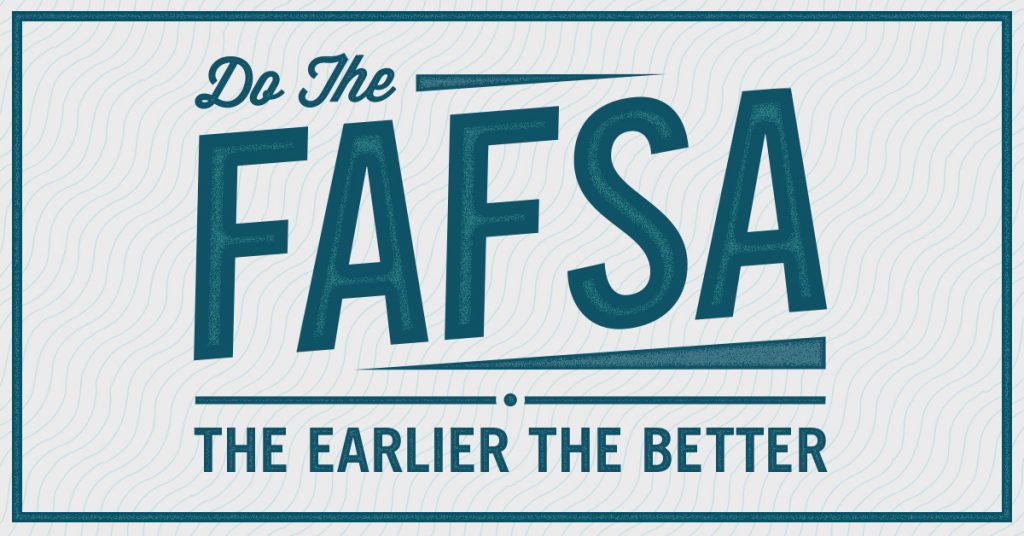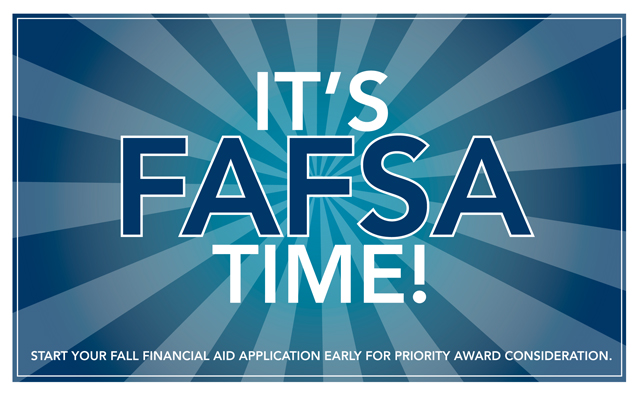By now, you have likely heard about the FAFSA, or Free Application for Federal Student Aid. The FAFSA is live as of today, October 1st.
What it is: "FAFSA stands for Free Application for Federal Student Aid. This form is used to determine the amount of money a family is expected to contribute to the price of attending a postsecondary institution. The results of the FAFSA are used in determining student grants, work study, and loan amounts."
Why it's important: Filing the FAFSA is important, regardless of whether or not you think you will qualify for financial aid. It's well worth your time to do so (plus it's easy, so no excuses). After you file the FAFSA (and have been accepted to a college), you will receive your formal financial aid offer (sometimes this comes with your acceptance, sometimes is comes separately). It's only then you will know how much your education is going to cost for that particular school (this is a reason you should consider waiting to accept an admissions offer until after you receive all financial aid offers if finances are an important part of the equation. Double depositing is also an ethical violation, so no deposits yet!). The FAFSA also serves as the paperwork necessary to qualify for federal loans (all students, regardless of income, qualify for $5,500 in federal loans. This is a student loan in the student's name). The interest rate you will get is way better than the bank for these federal loans.
What can I do right now? There is no longer a PIN for the FAFSA; it has been replaced by what is called the FSA ID. The FSA ID is how you submit the FAFSA electronically. It serves as your certified digital signature. You can sign up for this now (and I recommend you do so if you have not already). Both you and your student will need an FSA ID to complete the FAFSA. Only one parents needs an FSA ID. You can get that set up right now through this link: https://fsaid.ed.gov/npas/index.htm
When can I file the FAFSA? Starting October 1st, you will be able to use that FSA ID to complete the FAFSA. October 1 is the earliest you can complete the form. I recommend doing it as soon after October 1st as possible (within the first week that it's open). You do not need to have filed this year's taxes to complete the FAFSA. Instead, you'll be using tax information from the most recently filed tax year (this is also a relatively new change to the FAFSA, called Prior-Prior-Year. You can read more about that here). The important thing is filing early.
Where do I go to file the FAFSA? This is the link you can use to file the FAFSA starting in October: https://fafsa.ed.gov
What do I need to have ready?
- Your Social Security Number
- Your most recent federal income tax returns, W-2s, and other records of money earned. (Note: You may be able to transfer your federal tax return information into your FAFSA using the IRS Data Retrieval Tool. If you have filed your taxes electronically you can use the IRS DRT, and you should because it minimizes the risk of your FAFSA being selected for verification, which happens to about one-third of filers and delays the sending of your financial aid offer)
- Bank statements and records of investments (if applicable)
- Records of untaxed income (if applicable)
- An FSA ID to sign electronically.
If you have any questions about how to file the FAFSA, there are numerous free resources out there. I am linking to a super in depth guide put out by a company called Edvisors, which specializes in college financial aid consulting. It's a terrific guide.
For nuanced or unique questions, I would consult the website finaid.org. It's also fine to contact the financial aid office of your student's colleges directly. This is the one part of the process where it's okay for parents to steer communication. For everything else, students have to do the communicating themselves (you know the drill!) :)
One more thing to be aware of with financial aid forms is that there are several colleges, especially private colleges, that require additional forms like the CSS profile or a university specific financial aid form. To check to see if any of your colleges require the CSS Profile (in addition to the FAFSA), you can check this link: https://profileonline.collegeboard.org/prf/PXRemotePartInstitutionServlet/PXRemotePartInstitutionServlet.srv
For every school to which you have applied, you should consult the school's financial aid webpage. Check the deadlines and requirements for each college.
I hope your fall is off to a great start. I am thankful for so many things, and working with awesome students and families is one of the most important in my life. I truly love what I do and I am honored and thankful to you for allowing me the opportunity.
Let me know if you have any questions! And feel free to forward this guide along to other families if they will benefit.
Thanks!
Erika and the Guru Team







 RSS Feed
RSS Feed
